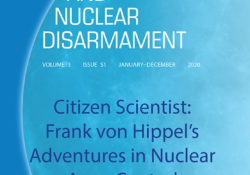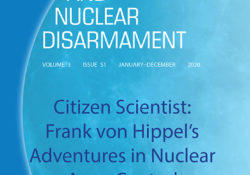tandfonline.com har udgivet en rapport under søgningen “Teacher Education Mathematics”: ABSTRACT ABSTRACT In this part, von Hippel discusses how his focus shifted in the first decade of the 21st century to a set of new concerns evoked by the terrorist attacks of 11 September 2001 and the G.W. Bush administration’s retrograde policies with regard to nuclear arms control and nonproliferation. During this period, he co-founded the International Panel on Fissile Materials so that policy activists working in opposition to nuclear arms races and fissile material production in different countries could work together. He also focused on fostering another generation of activist scientists engaged with the nuclear arms control and nonproliferation agenda. Link til kilde
Like this:
Like Loading...
tandfonline.com har udgivet en rapport under søgningen “Teacher Education Mathematics”: ABSTRACT ABSTRACT von Hippel describes a transparency tour during the summer of 1989 to the Soviet Union’s first plutonium-production complex in the Urals and to the Soviet test site for anti-satellite lasers in Kazakhstan. In December 1991, immediately after Ukraine declared independence, he participated in a mission to persuade it to return its nuclear weapons to Russia. He describes the thus far unsuccessful effort to dispose of the weapons plutonium that the US and Soviet Union declared excess at the end of the Cold War. The discussion then turns to the US-Russian lab-to-lab program in which the US nuclear-weapon laboratories helped Russia upgrade the security of its plutonium and highly-enriched uranium for the new and more open environment and to… Continue Reading →
Like this:
Like Loading...
eric.ed.gov har udgivet: This volume presents historical sketches of events and scientists. Produced for use by teachers using the MINNEMAST curriculum materials, the material is intended to exhibit the roles of processes in science throughout history. The seven stories included concern Anaxagoras, Achimedes, Napier, the development of the telescope and microscope, Louis Agassiz, Otheniel Marsh and natural history, and ancient systems of numeration. A table provides the teacher with information concerning the skills and concepts illustrated by each story. The processes listed are: calculation, classification, description, experimentation, hypothesis making, measurement, model building, and observation. (SD) Link til kilde
Like this:
Like Loading...

